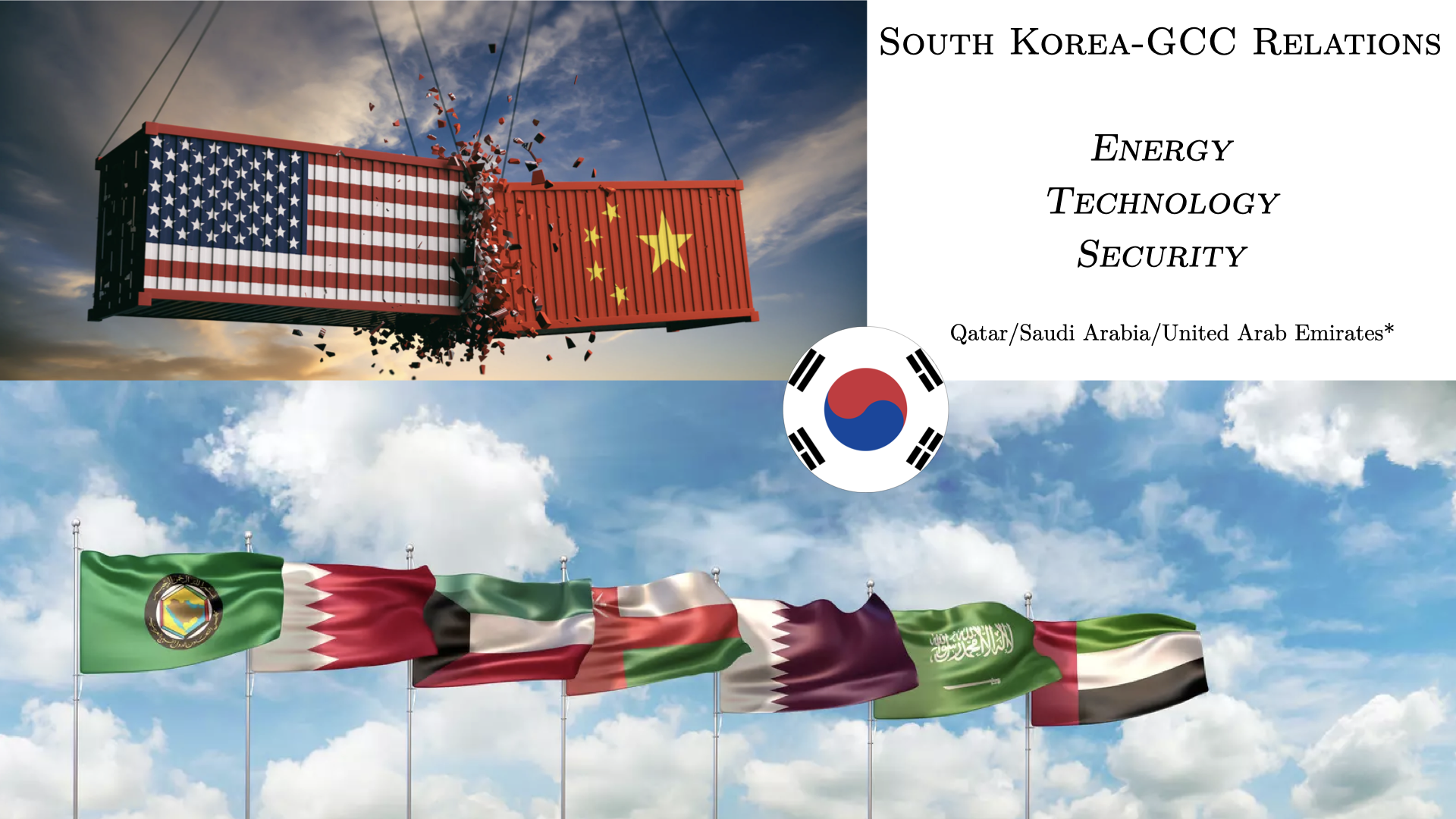
-
South Korea-GCC Relations: Energy, Technology, Security
Middle East Council on Global Affairs (MECGA: formerly Brookings Doha Center): Doha, Qatar
I am conducting this project as a visiting fellow of the Middle East Council on Global Affairs from August 2023 to October 2024. From November 2024, I transition as a non-resident fellow and continue the project from Singapore, contributing additional issue briefs on digital technologies.
What are the sources of mutual interest in the areas of energy, technology and security between South Korea and the Gulf states? Given their respective goals and policy initiatives, what obstacles or policy hurdles do they face as they seek to bring together efforts in each bilateral relationship? This project intends to investigate in detail the underlying sources of rapprochement between South Korea and three major Gulf states – Saudi Arabia, the United Arab Emirates, and Qatar – in the process of meeting goals for decarbonization and digitization amid growing geopolitical tensions.
In the past decade, South Korea has become an indispensable player in the Gulf, and its bilateral relationships with three major Gulf states have become an essential component of the country’s foreign policy and economic initiatives. My previous work with MECGA has identified the sources of the rapprochement between South Korea and the Gulf states, and underlined that the evolution of South Korea-GCC relations is driven by the need for diversification amid geopolitical uncertainties.
Towards the end of the pandemic in 2022 and 2023, the bilateral relationships were reinforced between each of the three Gulf states that South Korea relies on heavily for its energy demand and investment, and cooperation on industries and arms transactions was sought for by the Gulf states. While MOUs that have been signed between South Korea and each of the Gulf States indicate that there are several areas of mutual benefit upon collaboration, and concerns remain regarding the actual delivery of the goals mentioned in the MOUs, through public-private partnership and the roles played by businesses and governments.
The level of current analysis on the recent developments of the relationships is far from exhaustive and therefore requires a careful and elaborate analysis on each of the areas announced for cooperation. Given the nexus of public-private interests and policymaking, agendas set by governments must be delivered by fostering and guiding businesses to reach their potential through opportunities indicated in the MOUs.
Throughout the proposed yearlong project, and the challenges toward meeting respective goals in the following three areas:
- Energy – Climate Change and Decarbonization
- Technology – Digital Transition and the Tech War
- Security – Geopolitics amid U.S.-China Tensions and the Ukraine War
The methodology will involve a combination of fieldwork for surveying the landscape of policy initiatives and canvassing the status of the industries in both South Korea and each of the Gulf states as per the content of the MOUs signed in the case of Saudi Arabia and the UAE during the Yoon Seok-Yeol administration (incumbent) of South Korea, and in the case of Qatar, recent exchanges and dialogues beyond the MOUs signed during the Moon Jae-in administration (previous). It will include visits to the cities of Abu Dhabi, Dubai, and Riyadh while interviews are conducted also in Doha while in residence. Interviews will be held with businesspersons, government officials, policy analysts and academics.
Outcomes of the project:
- June Park. “AI Competition amid Expansion of U.S. AI Chip Export Controls into the Gulf.” Issue Brief, Middle East Council on Global Affairs. June 30, 2024. (Arabic)
- June Park. “CBDC Global Pioneers: A Roadmap for Gulf Countries.” Issue Brief, Middle East Council on Global Affairs. February 8, 2024. (Arabic)
- June Park. “EVs and Batteries in the Gulf: Industrial Policy amid Tariff Wars and the Battle for Market Access,” Issue Brief, Middle East Council on Global Affairs. TBD. (Arabic)
- June Park. “AI Chips and Data Centers in the Gulf: Investing in Running and Powering AI in the Tech War,” Issue Brief, Middle East Council on Global Affairs. TBD. (Arabic)
- Workshops on Emerging Technologies in the Gulf
Small States Research Program, Georgetown University in Qatar (GU-Q): Doha, Qatar
From September 2023, I will be serving as Expert PI (Principal Investigator) and Convener of the Workshops on Emerging Technologies in the Gulf, a multi-year project for the Small States Research Program at Georgetown University in Qatar (GU-Q).
Workshop 1: 5G/6G (Anticipated Dates: Q2 2024)
The issue of 5G disparity across the globe after the Huawei ban of 2019 is a central issue in an era of geopolitical fragmentation. This project investigates how the U.S.-China tech war in the 5G network realm impacts countries and citizens, and what government policies and business models should be adopted for digital inclusion via reliable and effective 5g rollouts and affordable plans. The project will be conducted using 1) GIS mapping of 5G, 2) research on government policies, business models for 5G rollouts, and effects on business and individual consumers, and 3) fieldwork on 5G implementations and policy recommendations. Specifically, this project attempts to examine the levels of 5G adoption across the Arab Gulf states in the post-pandemic era in which digitization is accelerated. This is especially relevant as across the Gulf where there are serious factors that should be considered in regard to the implementation of 5G and 6G, and where artificial intelligence and cloud infrastructure to support 5G rollouts are visible or in progress.
